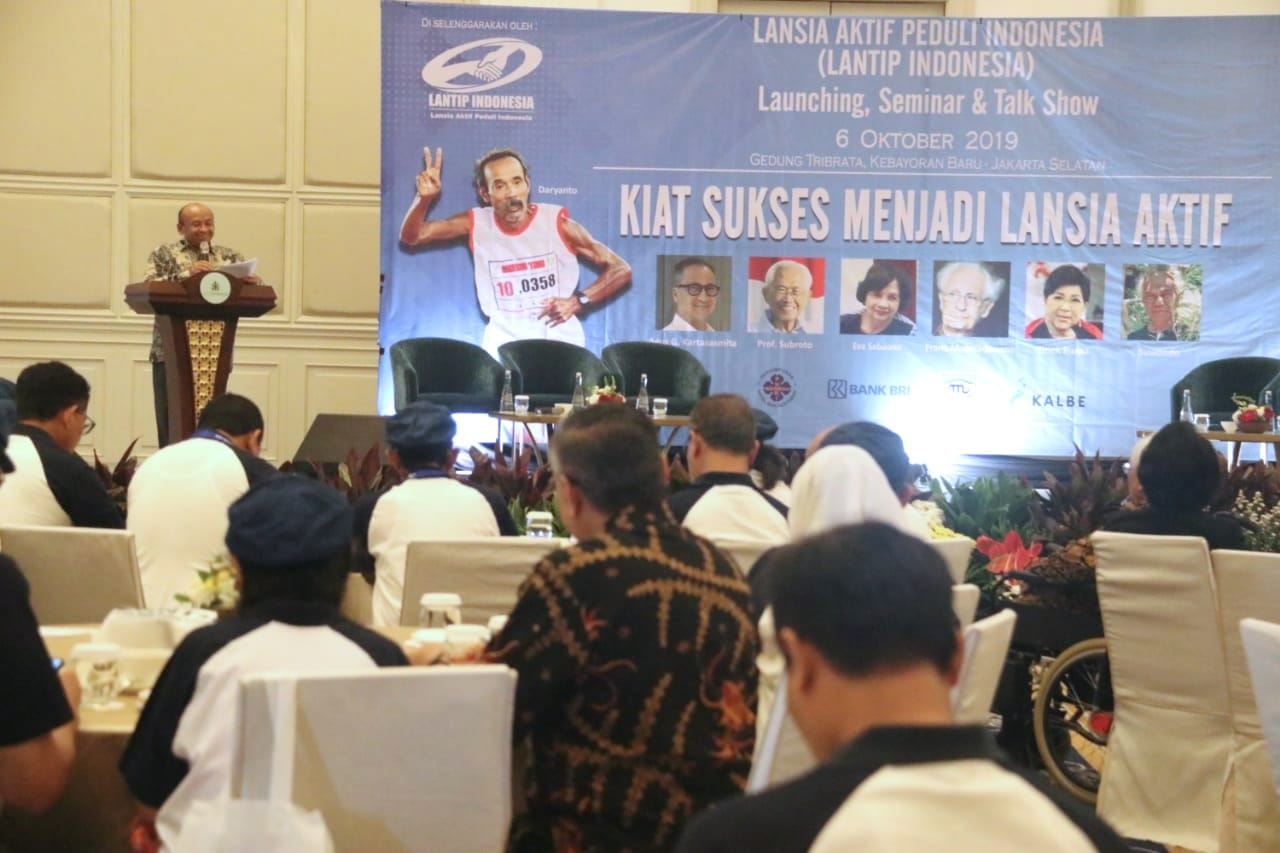Strengthen Services for the Elderly, Minister of Social Affairs Exposes 4 Important Steps

JAKARTA (October 6, 2019) - The elderly population tends to increase in line with the improvement in the quality of human life in Indonesia. To create a conducive environment for the elderly, Minister of Social Affairs Agus Gumiwang Kartasasmita emphasized the importance of implementing four aspects of policy.
First, building families must be aware of the health of the elderly as a whole. "Family is the most important element for the nation and state. From the family, we can hope to realize an active, healthy, and still useful elderly for the nation and state," said the Minister of Social Affairs in his written remarks read by the Director General of Social Rehabilitation Edi Suharto in a seminar and talk show "Tips for Success in Becoming Active, Healthy and Still Useful Elderly for the Nation and State", in Jakarta, Sunday (6/10).
Representing the Minister of Social Affairs, Edi was present as the keynote speaker at the seminar organized by the Active Elderly Association (Lantip), which presented several elderly people who are still active.
Family awareness is considered quite important, especially in detecting the vulnerability of the elderly. Edi explained, "The elderly need to be understood from the previous aspects of life (child phase, adolescent phase, and adult phase) following the life cycle approach. Well, strengthening this kind of family is the task of the central and regional governments."
Second, all parties including the central and regional governments are required to be proactive in providing support. The community is expected to open the widest possible opportunities for the elderly, among others, by providing employment opportunities according to their abilities and providing public spaces for the elderly to express themselves.
It is important to provide support services for the elderly such as worship facilities, and mental and spiritual support services. In addition, it is necessary to guarantee the health of displaced elderly people in nursing homes or social institutions so that the elderly feel cared for and not alienated.
Third, in line with innovations in communication technology, the use of technology in supporting services for the elderly is seen as important because it can realize an elderly who is independent and does not burden the family. For example, by providing access to state services online i.e health consulting services, economic consultations, and social services.
Last but not least, the real action of the central and regional governments to ensure the ease of use of public facilities for the elderly. Among other things, elderly-friendly health centers, office building facilities, shopping centers, markets, bus terminals, train stations, city parks, and so on. With the reorganization of all these facilities following the special needs and limitations of the elderly, they can carry out activities comfortably in their daily lives.
These four notes cannot be separated from the statistical data on the elderly based on several surveys. Quoting the results of the 2018 National Social and Economic Survey (Susenas), the elderly population in Indonesia reached 24.49 million people.
This figure is predicted to continue to increase in the following years. Or in other terms, Indonesia's demographic structure is classified as an old structure. "So we must take anticipatory steps so that the elderly in Indonesia are healthier and more productive so that they can continue to play a role in national development," he said.
On the same occasion, Edi also stated that the Ministry of Social Affairs has a program for the elderly called Progres LU (elderly social rehabilitation program). In it, according to terms of regulation, the Ministry of Social Affairs encourages the implementation of the Elderly Law. Second, the Ministry of Social Affairs is closing ranks to revise the law on the elderly.
"Yes, hopefully, next year it can enter the National Legislation Program," said Edi. In serving the elderly, the Ministry of Social Affairs always involves the community, namely the Social Welfare Institution (LKS) including Lantip. In addition, rehabilitation programs for the elderly are carried out by the Ministry of Social Affairs hall by strengthening the capacity of institutions owned by local governments. Services are also carried out outside the orphanage with family support and daycare.
"The number of elderly people directly assisted by the Ministry of Social Affairs is 70,000 people," said Edi.
"In general, there are four types of central assistance (Ministry of Social Affairs). First, BANTU (Purposeful Assistance), which is the provision of financial assistance such as cash transfers directed at strengthening their access to elderly service centers around where they live. "For example for health services. Especially for the elderly who are less fortunate," he said.
The second is assistance in the form of therapy. There are at least four types of therapy services for the elderly, namely physical therapy in the form of health assistance, and physical activities to keep them optimal. The second is psychosocial therapy, including counseling, and increasing self-confidence so that their spirit grows. "So besides physical, we also pay attention to psychological," said Edi.
The third assistance, said Edi, is in the form of mental and spiritual services. "This is important because our spirituality increases in old age," he said. The last one is in the form of a lively hold which consists of three types.
First, life skills, which are expected to help the elderly remain active in meeting their needs.
Second, vocational training is the concern of the Ministry of Social Affairs. It is intended that the elderly can still have simple skills and can contribute to the environment such as sewing, painting, and so on.
The last is entrepreneurial ability. "Even though old age does not mean that opportunities for the elderly to become entrepreneurs are closed. In fact, in many cases, people achieve business success at an advanced age," said Edi.
Acting Head of Public Relations Bureau RI Ministry of Social Affairs
Sonny W. Manalu
 English
English
 Bahasa
Bahasa
